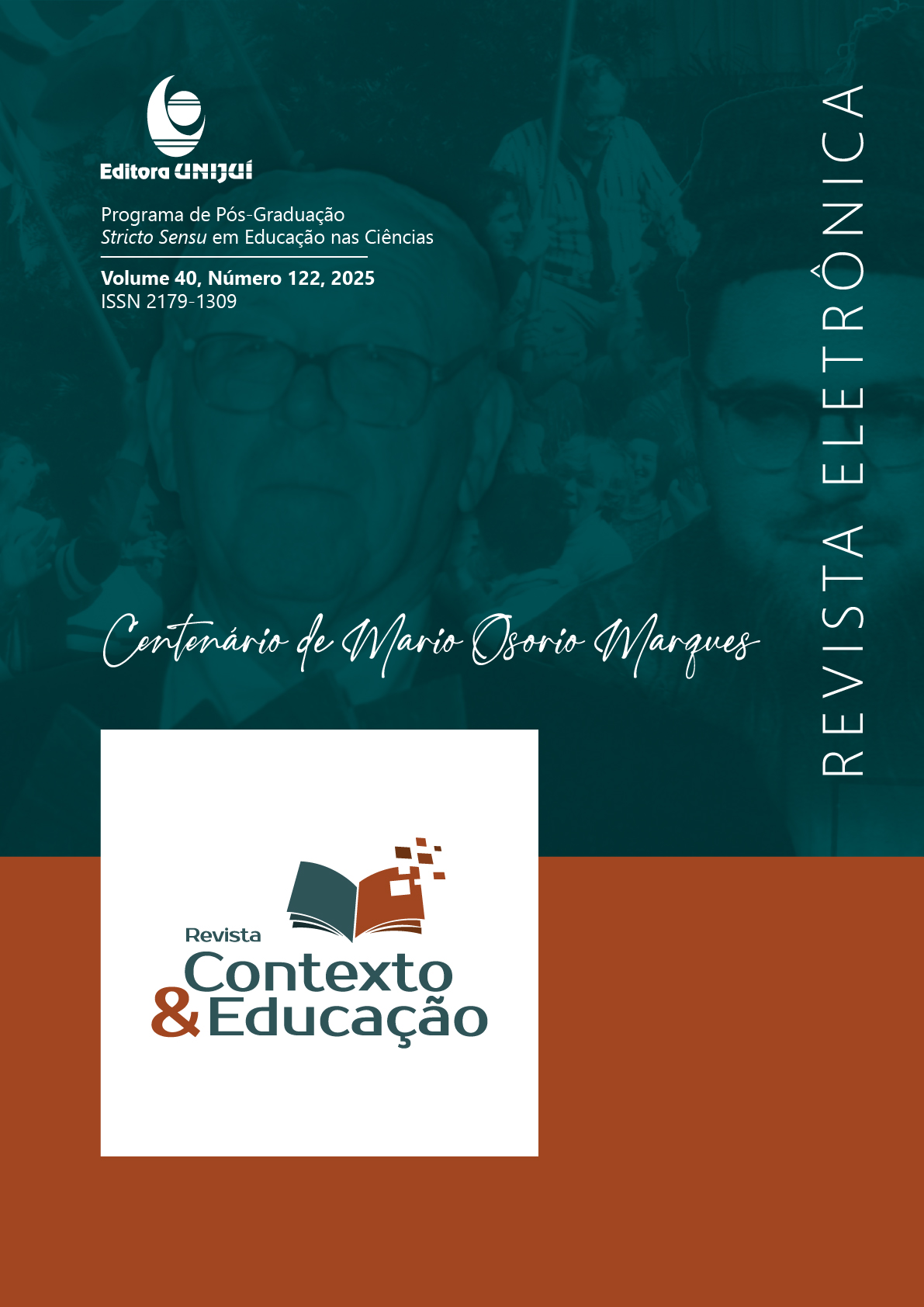Pedagogical practice with the TEACCH methodology: Development of digital games by people with autism spectrum disorder using Scratch
DOI:
https://doi.org/10.21527/2179-1309.2025.122.15535Keywords:
Digital games, TEACCH, Scratch, Autism Spectrum DisorderAbstract
The objective of this study is to describe a pedagogical practice carried out with subjects who have ASD and who developed digital games using the Scratch platform, based on the characteristics of the TEACCH methodology. Regarding the methodology, this research is of a qualitative nature, with the participation of two subjects with ASD. For data collection, participant observation was conducted, along with the collection of materials they produced. Thematic analysis (Braun; Clarke, 2006) was used for interpreting the materials they produced. We also sought to investigate the context of the participating subjects' scenario, encouraging approaches to concepts relevant to the content taught. The main results helped to understand that efforts to combine technologies and learning methodologies aimed at subjects with ASD can contribute to the training of these students and result in significant learning (Leite, Rehfeldt; Lopes, 2019), in addition to advancement in social relationships and interactions, as well as in the process of developing autonomy. Even with challenges, considering the particularity of each participating subject, it was possible to highlight benefits provided by developing this pedagogical practice, such as creative expression, stimulation of logical thinking, improvement of social skills and engagement of participants in the digital game creation process.
References
AMERICAN PSYCHOLOGICAL ASSOCIATION. Manual diagnóstico e estatístico de transtornos mentais (DSM-5). 5ª ed. Porto Alegre: Artmed, 2014.
BITTENCOURT, Aline Lourenço; DE MEIRELLES, Rosane Moreira Silva. A pandemia da COVID-19 e o impacto na vida das famílias com crianças com Transtorno do Espectro Autista. Revista Contexto & Educação, v. 38, n. 120, p. e13428, 2023. DOI: 10.21527/2179-1309.2023.120.13428.
BRAUN, V.; CLARKE, V. Using thematic analysis in psychology. Qualitative Research in Psychology, v. 3, n. 2. p. 77-101. 2006.
ESCRIBANO, Carmen Lopez; SÁNCHEZ-MONTOYA, Rafael. Scratch y necesidades educativas especiales: Programación para todos. Revista de educación a distancia (RED), v. 1, n. 34, 2012.
FONSECA, Maria Elisa Granchi; CIOLA, Juliana de Cássia Baptistella. Vejo e Aprendo: Fundamentos do Programa TEACCH: o ensino estruturado para pessoas com autismo. Ribeirão Preto: Book Toy, 2014.
GALVÃO FILHO, Teófilo Alves. Tecnologia Assistiva para uma Escola Inclusiva: apropriação, demandas e perspectivas. Tese (Doutorado em Educação) – Universidade Federal da Bahia, Salvador, 2009.
LEITE, Danilo Pantoja; REHFELDT, Márcia Jussara Hepp; LOPES, Maria Isabel. Possibilidade de uso do Scratch para a introdução ao ensino de desenvolvimento de jogos digitais por pessoas com Transtorno do Espectro Autista: estudo de caso. 2019. Produto educacional — Universidade do Vale do Taquari – Univates, Lajeado, 2019. Disponível em: https://www.univates.br/ppgece/media/pdf/2019/danilo_pantoja_leite-1.pdf. Acesso em: 21 fev. 2025.
MALONEY, John, RESNICK, Mitchel, RUSK, Natalie, SILVERMAN, Brian, EASTMOND, Evelyn. The scratch programming language and environment. ACM Transactions on Computing Education (TOCE), v. 10, n. 4, p. 1-15, 2010.
MONTE, Francisca Furtado do; SANTOS, Idê Borges dos. Saberes e práticas da inclusão, dificuldades acentuadas de aprendizagem: autismo. Brasília: MEC, SEESP, 2004.
NASCIMENTO, Izaildes Santana do Nascimento. Educação e práticas inclusivas: a criança com Transtorno do Espectro Autista no centro do processo de aprendizagem. Trabalho de Conclusão de Curso – Faculdade Ânima. Paripiranga, 2021.
NEVES, José Luis. Pesquisa qualitativa: características, usos e possibilidades. Caderno de pesquisas em administração, v. 1, n. 3, p. 1-5, 1996.
ORRÚ, Sílvia Ester. Aprendizes com autismo: aprendizagens por eixos de interesse em espaços não excludentes. Petrópolis: Editora Vozes, 2016.
SCRATCH BRASIL. O que é o Scratch? 2020. Disponível em: https://scratchbrasil.org.br/. Acesso em: 27 setembro 2019.
SILVA, Mídia Larreia Alves da. A ferramenta scratch: uma proposta lúdica de ensino para aprendizagem de estudantes com transtorno do espectro autista. Dissertação (Mestrado em Metodologias para o Ensino de Linguagens e suas Tecnologias) – Universidade Norte do Paraná, Londrina, 2022.
SHAW, Gisele Soares Lemos; DE OLIVEIRA, Letícia Maria. Oficinas interdisciplinares remotas: o ensino de ciências para pessoas com transtorno do espectro autista e a busca pela inclusão. Revista Contexto & Educação, v. 37, n. 116, p. 164–182, 2022. DOI: 10.21527/2179-1309.2022.116.12427.
Downloads
Published
How to Cite
Issue
Section
License
Copyright (c) 2025 Revista Contexto & Educação

This work is licensed under a Creative Commons Attribution 4.0 International License.
By publishing in Revista Contexto & Educação, authors agree to the following terms:
All works are published under the Creative Commons Attribution 4.0 International License (CC BY 4.0), which allows:
Sharing — to copy and redistribute the material in any medium or format;
Adaptation — to remix, transform, and build upon the material for any purpose, even commercially.
These permissions are irrevocable, provided that the following terms are respected:
Attribution — authors must be properly credited, a link to the license must be provided, and any changes made must be indicated.
No additional restrictions — no legal or technological measures may be applied that legally restrict others from doing anything the license permits.
Notices:
The license does not apply to elements that are in the public domain or covered by legal exceptions.
The license does not grant all necessary rights for specific uses (e.g., image rights, privacy, or moral rights).
The journal is not responsible for the opinions expressed in the articles, which are the sole responsibility of the authors. The Editor, with the support of the Editorial Board, reserves the right to suggest or request modifications when necessary.
Only original scientific articles presenting research results of interest that have not been previously published or simultaneously submitted to another journal with the same purpose will be accepted.
Mentions of trademarks or specific products are intended solely for identification purposes and do not imply any promotional relationship by the authors or the journal.
License Agreement (for articles published from October 2025): Authors retain the copyright to their article and grant Revista Contexto & Educação the right of first publication.


